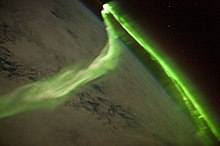Aurora
An aurora (plural: auroras or aurorae) is a natural light display in the sky, particularly in the polar regions, caused by the collision of charged particles directed by the Earth's magnetic field. An aurora is usually observed at night and typically occurs in the ionosphere. It is also referred to as a polar aurora or, collectively, as polar lights. These phenomena are commonly visible between 60 and 72 degrees north and south latitudes, which place them in a ring just within the Arctic and Antarctic polar circles. Auroras do occur deeper inside the polar regions, but these are infrequent and often invisible to the naked eye.

Of greatest heaven gan to open fayre,
And Phœbus, fresh as brydegrome to his mate,
Came dauncing forth, shaking his dewie hayre;
And hurls his glistring beams through gloomy ayre.

At this time of year,
at this time of day,
in this part of the country,
localized entirely within your kitchen!?
In northern latitudes, the effect is known as the aurora borealis (or the northern lights), named after the Roman goddess of dawn, Aurora, and the Greek name for the north wind, Boreas, by Pierre Gassendi in 1621. Auroras seen near the magnetic pole may be high overhead, but from farther away, they illuminate the northern horizon as a greenish glow or sometimes a faint red, as if the Sun were rising from an unusual direction. The aurora borealis most often occurs near the equinoxes. The northern lights have had a number of names throughout history. The Cree call this phenomenon the "Dance of the Spirits". In Europe, in the Middle Ages, the auroras were commonly believed a sign from God.
Quotes
edit- With the aurora borealis flaming coldly overhead, or the stars leaping in the frost dance, and the land numb and frozen under its pall of snow, this song of the huskies might have been the defiance of life, only it was pitched in minor key, with long-drawn wailings and half-sobs, and was more the pleading of life, the articulate travail of existence. It was an old song, old as the breed itself—one of the first songs of the younger world in a day when songs were sad.
- Jack London, The Call of the Wild (1903), Ch. 3
Dialogue
edit- [Principal Skinner's kitchen catches on fire in the middle of dinner with Superintendant Chalmers]Principal Skinner: Well, that was wonderful. Good time was had by all. I'm pooped.Superintendant Chalmers: Yes, I should be— [notices the fire] Good Lord, what is happening in there?Skinner: Aurora borealis.Chalmers: [fed up] Aurora borealis!? At this time of year, at this time of day, in this part of the country, localized entirely within your kitchen!?Skinner: Yes.Chalmers: [pause] May I see it?Skinner: [pause] No.
- The Simpsons, Season 7, Episode 21: 22 Short Films About Springfield (1996)